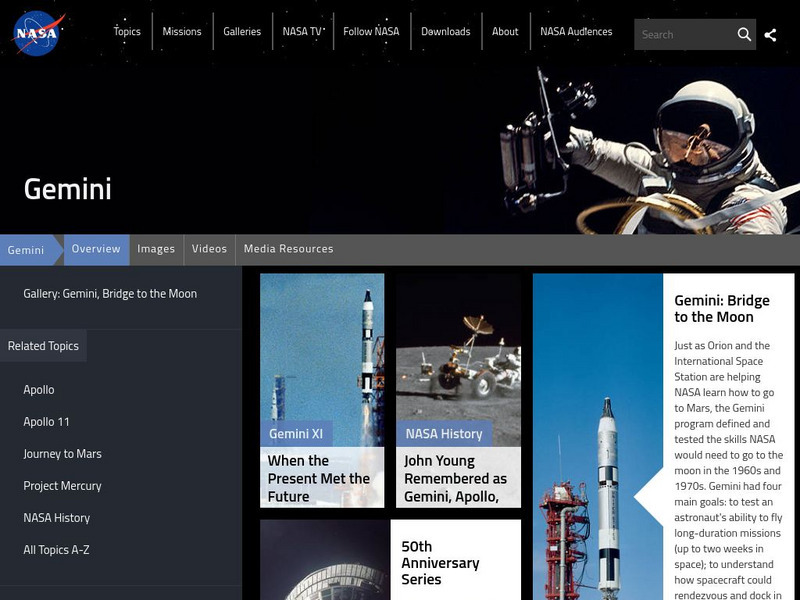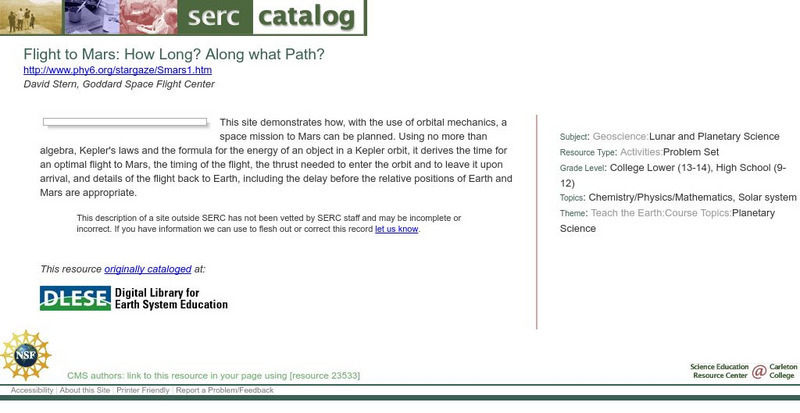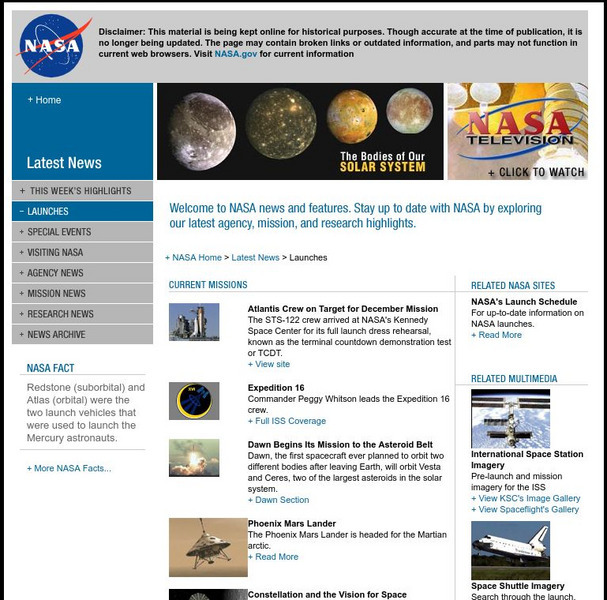Hi, what do you want to do?
NASA
Nasa: Orion: Nasa's New Spacecraft on the Journey to Mars
Learn all about the spacecraft Orion, which took its first flight to space in December 2014. A trip to Mars is planned next. Learn how its design compares to that of the Apollo, what new technology it has, and what has been done to...
Smithsonian Institution
National Air and Space Museum: Wright Brothers: Interactive Experiments
Three interactives in an online exhibition about the Wright Brothers. The first is an engineering activity on the forces of flight, and is accompanied by a lesson plan for Grades 6-8. The second is a gallery of original artifacts related...
NASA
Nasa: Solar Energy for Space Exploration
This activity book includes lessons and objectives for students to explore solar energy for space exploration. Students will play an active part in decision making for space exploration.
NASA
Marshall Space Flight Center: Timeline of Rocket History
This graphical presentation includes a collection of more than 50 images and descriptions tracing rocketry from ancient times to the present day.
NASA
Nasa: Gemini: Stepping Stone to the Moon: 40 Years Later
On the 40th anniversary of the launch of Gemini XII, NASA offers a comprehensive overview of the manned space flight program that was the first to include two-man spacecraft and was designated Gemini in 1962.
Science Education Resource Center at Carleton College
Serc: Flight to Mars: How Long? Along What Path?
Demonstrate how, with the use of orbital mechanics, a space mission to Mars can be planned. Using no more than algebra, Kepler's laws and the formula for the energy of an object in a Kepler orbit, the exercise derives the time for an...
NASA
Nasa: Astronaut Biography: m.lopez Alegria
Read biographical facts about this Spanish-born astronaut who is the veteran of three space flights including the Columbia, the Discovery, and the Endeavour.
Texas A&M University
Human Physiology in Space
Learn about some of the environmental challenges facing humans in space.
NASA
Nasa: Tests Versus Time in the Race for Space
This NASA site offers a good description of the ongoing space race during the Kennedy administration, discussing the "nip and tuck" of the Soviet-U.S. race. Also includes a description of Kennedy's new special assistant for science and...
Science Buddies
Science Buddies: Two Stage Balloon Rocket
Middle schoolers will build a multi-stage balloon rocket that they can launch across the classroom while learning about real space flight and Newton's laws of motion.
NASA
Nasa: White Sands Test Facility
The White Sands Research Facility is a main research and testing area for the Department of Defense, NASA, and commercial industry. White Sands works with rocket propulsion, properties of materials, hazards assessment, oxygen systems,...
Smithsonian Institution
National Air and Space Museum: America by Air: Early Commercial Aviation
Commercial airlines took flight soon after the Wright brothers' famous first flights. Read about how the U.S. government encouraged the development of air travel.
NASA
Nasa: Upcoming Space Shuttle Launches
Updated information on details of the next scheduled shuttle launch, including mission objectives and crew biographies. A link is also included to mission reports of past Space Shuttle flights.
New York Times
New York Times: The Final Flight: Disaster Strikes a Venerable Spacecraft
Outstanding resource for studying the Space Shuttle Columbia disaster. Full illustrated explanations of the descent, the problem with foam, reports of last mission, debris, etc. Photos, audio, maps, and other graphics are available.
TED Talks
Ted: Ted Ed: If Superpowers Were Real: Flight
Is it scientifically possible to fly? In this series, creator Joy Lin tackles six superpowers and reveals just how scientifically realistic they can be to us mere mortals. [5:11]
US National Archives
Our Documents: Transcript of John Glenn's Official Communication
The official transcription of John Glenn's in-flight communication with Mission Control during his orbit around the earth in 1962.
Smithsonian Institution
National Air and Space Museum: Wright Brothers: Who Were Wilbur and Orville?
Classroom activities, interactive experiments, timelines, and other artifacts that celebrate the Wright brothers' first flight.
NASA
History of the Space Shuttle
Entry portal to NASA's site on the background and history of the Space Shuttle.
Smithsonian Institution
National Air and Space Museum: Wright Brothers: Embracing the Impossible [Pdf]
In this lesson, young scholars explore primary resources to see what people who lived in the early age of flight felt about this innovation. They then compare that response to that towards an invention of today.
CNN
Cnn: Space Shuttle Columbia Special Report
CNN.com provides a thorough look at the Space Shuttle Columbia disaster. Here, read press releases, watch videos, view images, and use interactive programs.
Other
Boston Globe: Space Shuttle Columbia: Final Moments
A graphic explanation of the final moments of the Space Shuttle Columbia.
NASA
Nasa: First Space Shuttle Mission Sts 1
NASA summary of the first flight of the space shuttle Columbia in 1981.
Smithsonian Institution
National Air and Space Museum: America by Air: Airline Expansion and Innovation
Air travel grew in the 1920s and 1930s despite the Great Depression. Read about the new commercial airlines of the time and what it was like to fly at the dawn of commercial passenger flight.
Other
Space Flight Now/air Breathing Rocket Engines
Short article on a experimental air breathing rocket engine.
Other popular searches
- Space Shuttle Flight Path
- Manned Space Flight
- Space Flight History
- History of Space Flight
- Human Space Flight
- \"Manned Space Flight
- "Manned Space Flight
- \\"Manned Space Flight
- \\\"Manned Space Flight
- American Space Flights
- Space Flight Report
























